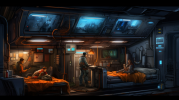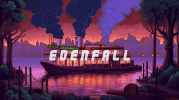logos
Unlucky Member
Hello,
I am currently working on a world called Edenfall. The gist of the story is a common fight-of-big-sticks trope where the conflict ends in a nuclear holocaust. Where it begins to diverge is a hard science-fiction approach through dystopian and cyberpunk megacorporations. The three major megacorporations, Kabusei, NewStar, and AurumGate, could effectively escape to the Moon while the Earth was burned below. Kabusei is the typical overbearing megacorporation that you would see in most dystopian films. NewStar represents the evil of industrial progress through mining and pollution, and AurumGate is a megabank. Now, 47 years after the "End Event," Kabusei wants to recolonize the Earth.
The "End Event" marks the day of the nuclear war. Starting in 2025, the Russo-Ukrainian War evolved into a full-scale conflict between NATO and CSTO (Russian NATO). That war ended in 2029 when Russian oligarchs usurp Vladimir Putin and sued for peace. In the same year, though, China invaded Taiwan, and the United States fought for a couple of months, then backed off. In 2034, North Korea nuked Seoul, and a war on the Korean Peninsula ensued, but the United States did not get involved because China warned of nuclear retaliation. China doesn't help NK in this war since they started it, but the Western powers pulled a Ukraine deal where they gave SK a lot of money and weapons. Japan is the only other country that helps SK. Similar to Russia, the Second Korean War ends in a coup. SK annexes the rest of the Korean peninsula. Because the West now had a direct border with China, the Chinese government waged full-scale economic and hybrid warfare that further destabilized the world. In 2054, a nuclear apocalypse happened for unknown reasons, though it is said the Chinese launched the missiles first.
Kabusei became successful by selling robocops to the Tokyo Metropolitan Police Department and eventually supplying the Japanese and South Korean governments with several divisions of robotroops during the Second Korean War. After their success through war profiteering, Kabusei continued to expand and eventually had a merger with Samsung. By 2050, Kabusei was a premiere space company and had mastered reusable spacecraft, even sending a colony ship to Mars. Leading up to the End Event, many people were on the Kabusei "K-Line" heading up to the Moon to join lunar colonies. In the 47 years between the End Event and their recolonization initiative begins, the Kabusei mainly stick to the Moon, asteroid belt, and Mars. Kabusei has chartered two major colonies, one in New York and the other in Texas. They have several reconnaissance and research outposts scattered throughout the country. Kabusei also operates a private "security force," the Kabusei Defense Service Group (KDSG), comprised of Kabusei employees and androids.
NewStar was an Australian mining company that successfully mined asteroids in partnership with Kabusei. After scientists at NewStar pioneered usable and broadly applicable hydrogen fuel cells, their prominence skyrocketed. Using their Heliocells, NewStar again partnered with Kabusei and the Australian Space Agency to charter an industrial and research facility on the Moon, the New Melbourne Complex. NMC exploited the natural resources of Mare Frigoris and pioneered with helium-3 thermonuclear fusion reactor. When NewStar became capable of producing 3He on an industrial level, NewStar began to export resources back to the Australian government, becoming the most profitable energy and mining company in history.
Kabusei and NewStar had a brief and bloody conflict in the early 2050s over regolith mining rights. The two came to an agreement where Kabusei sold their mining rights contracts in exchange for unlimited power supply to Kabusei colonies and stations on the Moon. Their relationship is periodically dotted with corporate espionage, assassinations, and "accidents" at each other's facilities. NewStar has also engaged in a rival colonization program, focusing on the Levant instead of the United States.
AurumGate was originally a London hedge fund that was incredibly successful and grew up into a big boy bank. Throughout a tumultuous second half of the 21st century, AurumGate was at the front lines of generating profit through selling war bonds, financing the arms manufacturers, and selling loans to several countries to rebuild their infrastructure and economy after the war. Only a couple of years after the End Event did AurumGate return to Earth. Using autonomous drones and a sophisticated global satellite network (Satcom), AurumGate placed hundreds of thousands of solar-powered, radiation-hardened terminals worldwide and facilitated an exchange network known as the Golden Gate. After Satcom and Golden Gate were established, AurumGate released "salvo," a cryptocurrency that now acts as the world's reserve currency, enabling trade between factions worldwide. Additionally, Terran factions can trade with NewStar and Kabusei through trading salvos.
This is generally a simplification of my current lore, but it hits on all the significant points. Please critique realism with some generosity for creativity. What do we think?
Thank you in advance for your support.
I am currently working on a world called Edenfall. The gist of the story is a common fight-of-big-sticks trope where the conflict ends in a nuclear holocaust. Where it begins to diverge is a hard science-fiction approach through dystopian and cyberpunk megacorporations. The three major megacorporations, Kabusei, NewStar, and AurumGate, could effectively escape to the Moon while the Earth was burned below. Kabusei is the typical overbearing megacorporation that you would see in most dystopian films. NewStar represents the evil of industrial progress through mining and pollution, and AurumGate is a megabank. Now, 47 years after the "End Event," Kabusei wants to recolonize the Earth.
The "End Event" marks the day of the nuclear war. Starting in 2025, the Russo-Ukrainian War evolved into a full-scale conflict between NATO and CSTO (Russian NATO). That war ended in 2029 when Russian oligarchs usurp Vladimir Putin and sued for peace. In the same year, though, China invaded Taiwan, and the United States fought for a couple of months, then backed off. In 2034, North Korea nuked Seoul, and a war on the Korean Peninsula ensued, but the United States did not get involved because China warned of nuclear retaliation. China doesn't help NK in this war since they started it, but the Western powers pulled a Ukraine deal where they gave SK a lot of money and weapons. Japan is the only other country that helps SK. Similar to Russia, the Second Korean War ends in a coup. SK annexes the rest of the Korean peninsula. Because the West now had a direct border with China, the Chinese government waged full-scale economic and hybrid warfare that further destabilized the world. In 2054, a nuclear apocalypse happened for unknown reasons, though it is said the Chinese launched the missiles first.
Kabusei became successful by selling robocops to the Tokyo Metropolitan Police Department and eventually supplying the Japanese and South Korean governments with several divisions of robotroops during the Second Korean War. After their success through war profiteering, Kabusei continued to expand and eventually had a merger with Samsung. By 2050, Kabusei was a premiere space company and had mastered reusable spacecraft, even sending a colony ship to Mars. Leading up to the End Event, many people were on the Kabusei "K-Line" heading up to the Moon to join lunar colonies. In the 47 years between the End Event and their recolonization initiative begins, the Kabusei mainly stick to the Moon, asteroid belt, and Mars. Kabusei has chartered two major colonies, one in New York and the other in Texas. They have several reconnaissance and research outposts scattered throughout the country. Kabusei also operates a private "security force," the Kabusei Defense Service Group (KDSG), comprised of Kabusei employees and androids.
NewStar was an Australian mining company that successfully mined asteroids in partnership with Kabusei. After scientists at NewStar pioneered usable and broadly applicable hydrogen fuel cells, their prominence skyrocketed. Using their Heliocells, NewStar again partnered with Kabusei and the Australian Space Agency to charter an industrial and research facility on the Moon, the New Melbourne Complex. NMC exploited the natural resources of Mare Frigoris and pioneered with helium-3 thermonuclear fusion reactor. When NewStar became capable of producing 3He on an industrial level, NewStar began to export resources back to the Australian government, becoming the most profitable energy and mining company in history.
Kabusei and NewStar had a brief and bloody conflict in the early 2050s over regolith mining rights. The two came to an agreement where Kabusei sold their mining rights contracts in exchange for unlimited power supply to Kabusei colonies and stations on the Moon. Their relationship is periodically dotted with corporate espionage, assassinations, and "accidents" at each other's facilities. NewStar has also engaged in a rival colonization program, focusing on the Levant instead of the United States.
AurumGate was originally a London hedge fund that was incredibly successful and grew up into a big boy bank. Throughout a tumultuous second half of the 21st century, AurumGate was at the front lines of generating profit through selling war bonds, financing the arms manufacturers, and selling loans to several countries to rebuild their infrastructure and economy after the war. Only a couple of years after the End Event did AurumGate return to Earth. Using autonomous drones and a sophisticated global satellite network (Satcom), AurumGate placed hundreds of thousands of solar-powered, radiation-hardened terminals worldwide and facilitated an exchange network known as the Golden Gate. After Satcom and Golden Gate were established, AurumGate released "salvo," a cryptocurrency that now acts as the world's reserve currency, enabling trade between factions worldwide. Additionally, Terran factions can trade with NewStar and Kabusei through trading salvos.
This is generally a simplification of my current lore, but it hits on all the significant points. Please critique realism with some generosity for creativity. What do we think?
Thank you in advance for your support.



